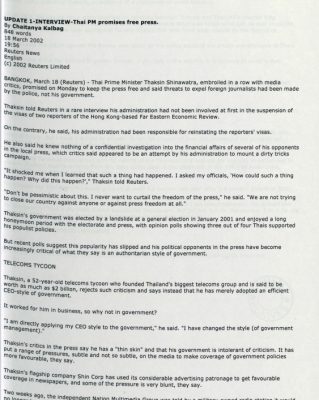INTERVIEW-Thai PM promises free press.
[Reuters]
Published date: 18th Mar 2002
18 March 2002
19:56
Reuters News
English
(c) 2002 Reuters Limited
BANGKOK, March 18 (Reuters) – Thai Prime Minister Thaksin Shinawatra, embroiled in a row with media
critics, promised on Monday to keep the press free and said threats to expel foreign journalists had been made by the police, not his government.
Thaksin told Reuters in a rare interview his administration had not been involved at first in the suspension of the visas of two reporters of the Hong Kong-based Far Eastern Economic Review.
On the contrary, he said, his administration had been responsible for reinstating the reporters’ visas.
He also said he knew nothing of a confidential investigation into the financial affairs of several of his opponents in the local press, which critics said appeared to be an attempt by his administration to mount a dirty tricks campaign.
“It shocked me when I learned that such a thing had happened. I asked my officials, ‘How could such a thing happen? Why did this happen?’,” Thaksin told Reuters.
“Don’t be pessimistic about this. I never want to curtail the freedom of the press,” he said. “We are not trying to close our country against anyone or against press freedom at all.”
Thaksin’s government was elected by a landslide at a general election in January 2001 and enjoyed a long honeymoon period with the electorate and press, with opinion polls showing three out of four Thais supported his populist policies.
But recent polls suggest this popularity has slipped and his political opponents in the press have become Increasingly critical of what they say is an authoritarian style of government.
TELECOMS TYCOON
Thaksin, a 52-year-old telecoms tycoon who founded Thailand’s biggest telecoms group and is said to be worth as much as $2 billion, rejects such criticism and says instead that he has merely adopted an efficient CEO-style of government.
It worked for him in business, so why not in government?
“I am directly applying my CEO style to the government, ” he said. “I have changed the style (of government management).”
Thaksin’s critics in the press say he has a “thin skin” and that his government is Intolerant of criticism. It has put a range of pressures, subtle and not so subtle, on the media to make coverage of government policies more favourable, they say.
Thaksin’s flagship company Shin Corp has used its considerable advertising patronage to get favourable
coverage in newspapers, and some of the pressure is very blunt, they say.
Two weeks ago, the independent Nation Multimedia Group was told by a military-owned radio station it would no longer be able to provide programmes after it aired an interview with a leading critic of Thaksin.
Nation editors then learned that they and their families were the subject of a secret investigation by the
country’s Anti Money-Laundering Office into their financial affairs.
CRACKDOWN ON PRESS
Critics also saw the revocation of the visas of the two Review reporters, who had both previously written stories highly critical of Thaksin, as evidence of a crackdown on press freedom.
In January, the Review ran a story touching on relations between Thaksin and Thailand’s revered King
Bhumibol Adulyadej, which was deemed by police to contravene strict laws about what can be said about the royal family. The Review later apologized for any offence that may have been caused by the magazine.
Thaksin said the action against the Review was taken by the police because the article was offensive to Thais.
“In the case of the Far Eastern Economic Review, If you look at the column, it is not nice to write in that
manner,” he said.
“Sometimes, especially people from the West may not understand how sensitive Thai people are about their royal family because the royal family is at the centre, the heart of the Thai people. We highly respect them,” he said.
Thaksin said he and his government had been misunderstood by the press and had come in for much criticism, Some of its unfair.
“I am probably one of the prime ministers that has been attacked most by the press both domestically and Internationally. But I have the right to explain, to tell the press that they misunderstand my government. I don’t want to get involved with their freedom at all,” he said.
Thaksin said he would push ahead with his reform of the Thal economy and use his majority in parliament to ensure Thailand kept recovering from the deep slump seen in the aftermath of the 1997/98 Asian crisis, triggered by the collapse of the Thai baht.
He forecast the Thai economy would grow by at least 3.5 percent this year after 1.8 percent growth in 2001.
“I do not want to have an MP base to strengthen my dictatorship, but I am (responsible for) the bottom line for the country. That is my style. I want success for the country. Not for me, but for the country. I do It for the country.” (With additional reporting by Andrew Browne and Chris Johnson).






